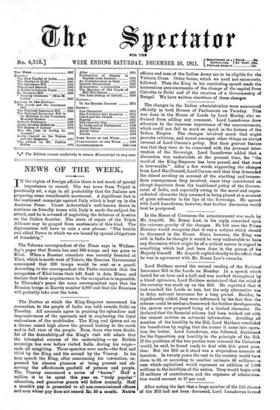The Durbar at which the King-Emperor announced his coronation to
the people of India was held outside Delhi on Tuesday. All accounts agree in praising the splendour and impressiveness of the spectacle and in erephazing the loyal enthusiasm of the multitudes. The King and Queen sat on a throne raised high above the ground looking to the north and in full view of the people. Even those who were doubt- ful of the desirability,of the King's visit will admit that the triumphal success of the undertaking — no British sovereign has ever before visited India during his reign— ends all misgiving. Three speeches were made—the first and third by the King and the second by the Viceroy. In his first speech the King, after announcing his coronation, ex- pressed his sincere pleasure at being present and ob- serving the affectionate goodwill of princes and people. The Viceroy announced a series of "boons." Half a million is to be spent this year on "truly popular" education, and generous grants will follow annually. Half a month's pay is presented to all non-oommissioned officers and men whose pay does not exceed Rs. 50 a month. NativO
officers and men of the Indian Army are to be eligible for the Victoria Cross. Other boons, which we need not enumerate, followed. Then the King in his concluding speech made the momentous announcements of the change of the capital from Calcutta to Delhi and of the creation of a Governorship of Bengal. We have written elsewhere of these changes.


















































